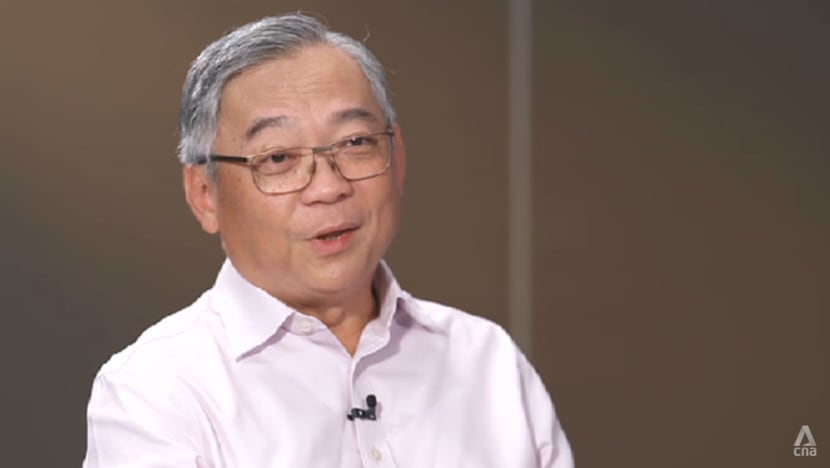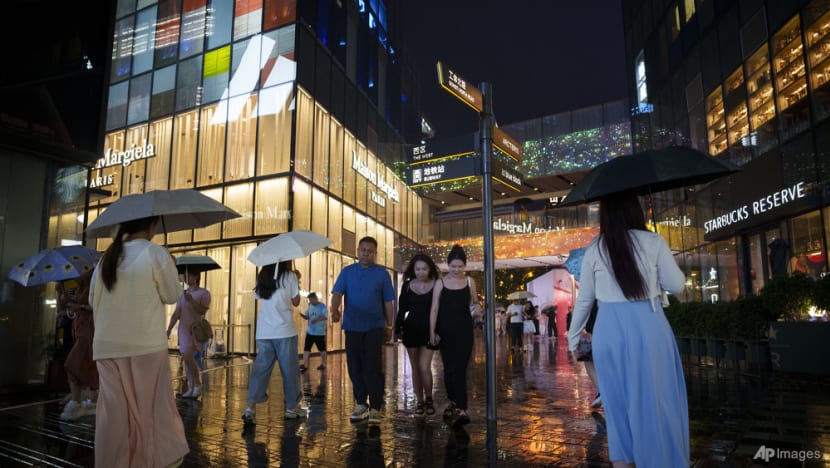Singapore and China looking to work together in new areas like sustainability, digital payments: Gan Kim Yong
Singapore and China are set to hold the Joint Council for Bilateral Cooperation meeting - the highest-level annual forum between both countries - on Monday (Nov 11).

Singapore Deputy Prime Minister Gan Kim Yong speaks to journalists about his priorities as co-chair of the Joint Council for Bilateral Cooperation (JCBC), which reviews collaboration between Singapore and China and charts the direction for cooperation between the two countries.

This audio is generated by an AI tool.
SINGAPORE: As the highest-level annual bilateral forum between Singapore and China enters its 20th year, both nations are looking to collaborate in new and emerging areas related to sustainability and the digital front, said Deputy Prime Minister Gan Kim Yong.
“We want to exchange views and ideas of how we can work together to move towards zero carbon in this transitional process,” he told reporters.
“Associated with this will be emerging green-economy related businesses - whether it's a carbon business, whether it's green financing (or) green investments. These will be projects that we are discussing.”
Mr Gan added that both governments will also discuss digital payment systems, digital trade documentation, and how to support each other’s digitalisation journey.
This will be the first time Mr Gan - who is also Minister for Trade and Industry - is co-chairing the Joint Council for Bilateral Cooperation (JCBC) and related joint steering council meetings for the Singapore-China government-to-government projects.
The JCBC is the apex bilateral platform that reviews and sets the strategic direction for cooperation between Singapore and China.
Mr Gan will co-chair the JCBC meeting in Singapore with Chinese Vice Premier Ding Xuexiang on Monday (Nov 11).
NEW AREAS TO WORK TOGETHER ON
In the interview with Singapore media, Mr Gan said the government is reviewing the three government-to-government projects that Singapore currently has with China.
These ongoing projects, which were launched by Singapore’s three past prime ministers, are the China-Singapore Suzhou Industrial Park, Tianjin Eco-City and the Chongqing Connectivity Initiative.
Mr Gan noted that all three recently celebrated or are celebrating anniversaries. This will give Singapore the chance to “review what we have done and what we plan to do going forward”, he said.
When asked if a fourth government-to-government project is on the cards, given that Prime Minister Lawrence Wong took over the helm earlier this year, Mr Gan said it should not be something tied to generations of leaders, but dependent on both nations’ needs and interests instead.
“I think our partnership must be built on mutual benefits, and this is a basis for collaboration. And therefore, I think it will evolve over time,” he added.
Citing state-level cooperation projects like the Guangzhou Knowledge City, as well as the Smart City Initiative with Shenzhen, Mr Gan said the Singapore-China partnership has evolved to become multifaceted.
"If you look at China and say that many things, we can go to China and teach them something that they don't know about, I think that will be the wrong approach. I think any bilateral relationship is always built on the win-win outcome,” he added.
“Even in the beginning, there are areas that they need support and help, and there are areas that we also need to have China's support.”
When asked how Singapore's new generation of leaders might engage with China, Mr Gan said it is important to "build trust and understanding in their own way, because very often this trust and understanding is very personal between the leaders."
"Every new generation they have to refresh and re-establish this relationship,” he added.
PERIOD OF TRANSITION FOR CHINA
With China's gross domestic product growing only 4.6 per cent year on year in the third quarter, which was lower than its annual target of about 5 per cent, Mr Gan said this marks a period of transition for the world's second-largest economy.
Prospects remain cautiously optimistic given China's expanding middle class, innovative enterprises and infrastructure development, he added.
Singapore’s partnership with China must be looked at from a long-term perspective, Mr Gan noted.
“For us to really engage with China, to do business in China, it's not trying to make a quick buck, invest a couple of years, make a profit and take the money and run,” he added.
“We have to take a longer-term view, invest in China and work hard in China, grow the business in China, and over time, I think you will reap the economic benefits and returns. China has many things going for it.”

HOW US’ STANCE ON CHINA WILL AFFECT SINGAPORE
Mr Gan was also asked about how America’s tough stance on China will affect Singapore’s relationship with superpowers and the wider Southeast Asia region.
On Wednesday (Nov 8), the United States elected its next president Donald Trump, who took an increasingly hawkish stance on China during his first term in office.
Mr Gan said it is in the interest of Singapore, being an open and small economy, to see a stable and peaceful relationship between the two superpowers.
“China has been our key economic partner. Therefore, we want to continue to be able to do business with China,” he noted.
“At the same time, we have also told our American friends that America is a very important partner to us too. In fact, they are the biggest investor in Singapore … and we told both sides that both of them are important to us.
“This is a very narrow pathway that we need to navigate, but we also emphasise to them that our relationship to them must be built on principles, and the principles must be Singapore's national interest.
“So no matter who we work with, whether it's US or China, any other country, always start from Singapore's national principles, always work for Singapore.”













.png?itok=RleM2H3s)






